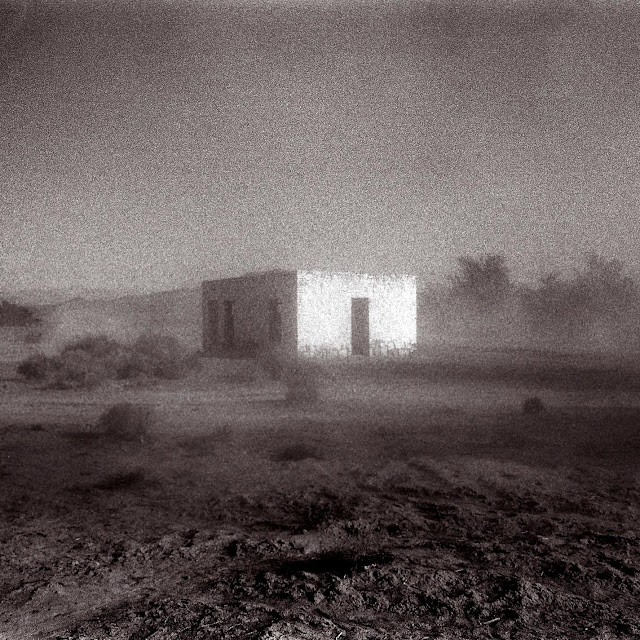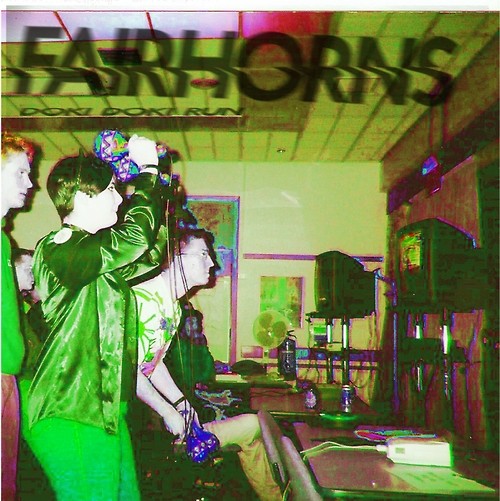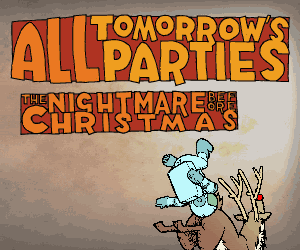
Given that it’s been so long since Reznor has released something designed purely to be listened to rather than to accompany visuals – video gaming or otherwise – it is a little disappointing to see a scant six tracks arrive in your inbox following the $5 purchase necessary to hear the latest output. However, How to destroy angels_ promise a follow-up LP in early 2013 and it is fair to say that Reznor has been a fairly busy boy these past two years, what with soundtracking two films, a video game, creating some new Beats with Dr. Dre, and making a couple of babies. Whilst Pitchfork would have you believe that Reznor recorded this EP in between smoking cigars with Gordon Gekko in a boardroom somewhere (since apparently “doing what interests you” when you’re over 40 just isn't in line with what the bedsit-indie 99% are musically fighting for in this day and age), it is better to critique this EP with regard to Reznor’s desired achievements of late, which are as simple as the answer to one question: is it interesting?
It’s safe to say one thing: yes, their An omen_ EP is interesting, but ‘interesting’ is an adjective that carries with it a world of connotation. It bears all the hallmarks of Reznor’s expert production and musical mastery – every song spins a rich tapestry of sonical wonder that the ears struggle to feast on in a mere 4 minutes. Songs must be revisited time and time again as new sounds are discovered, new beats heard, and new whispers hiss out of the speakers; drumbeats aggressively slap and punch against warm backdrops of ambience punctuated by swelling guitar drones and ethereal vocals. But still a question lingers: is it interesting?
An omen_ is interesting in as much as it is new. All of Reznor’s work is so rich in depth that it normally requires a month of focused listening before any truly meaningful evaluation can be determined. But that isn’t to say that first impressions count for a lot and with How to destroy angels_, first impressions have failed to blow the mind twice now. An omen_, however, opens with the brooding Keep it together, which whilst rich in atmosphere and texture – as though Thom Yorke’s The Eraser bred with Jamie Lidell’s Super_Collider – lacks the sonic face-thump that fans have now come to anticipate of Reznor (and I would argue even expect given nearly 3 years of ambient-heavy releases).
This is not to say that Keep it together is bad – quite on the contrary, it is one of the strongest tracks on the EP, but given the wait fans have patiently put up with for any form of new output from Reznor, it would have been nice to be greeted with a 2k12 Reznor equivalent of 1,000,000, Hyperpower! or Somewhat Damaged. Still, I must remind myself: this is categorically not Nine Inch Nails. Thankfully, the second track – Ice age – reaffirms this in presenting what is probably the happiest melody ever to appear in a Reznor-scribed song since Purest Feeling. At first, I was confused and frightened by this abrupt change in tone, but then I found it refreshing as a comforting brood of bass erupted into the song and droning, high-pitched oscillation swept over the close-mic recorded plucking. Shortly afterwards, however, I felt a sickening nausea and unease as Mariqueen Maandig Reznor’s vocals reminded me of none other than Sheryl Crow’s Everyday Is A Winding Road or Madonna’s woeful Don’t Tell Me. To date, I can still no longer enjoy this song, which is a true shame as it is – at 7 minutes – the cornerstone of the EP. Mercifully though, things are immediately hauled back on track (pun intended) with the next song as Mariqueen’s vocals sink back into the ether, overwhelmed by drums designed to rattle the skull.
On the wing signals the segue into what is the indubitably better half of the EP, starting with The sleep of reason produces monsters – a swelling, atmospheric 4-minute trip which feels like being alone, wrapped in a warm blanket in a stark, snow-covered Scandinavian field. It is thereby intensely reminiscent of Reznor’s work on The Girl with the Dragon Tattoo and builds brilliantly up to what is undoubtedly the greatest song on the EP, and possibly the greatest track Reznor has produced in the last 3 to 4 years: The loop closes. Left to my own devices, I could write an entire review on this song alone: it is classic Reznor, and a superb demonstration of his greatest skill as a musician. Atonal, off-beat bleeps, thuds and noise grate against the ear but gradually morph, distort and swell into a compelling and utterly seductive tapestry of ecstasy, before getting smothered in a drumbeat so sultry that the song instantly gains an enigmatic sex appeal so strong that I am sure it was designed for machines to fuck to, were they biological. This swelling seduction builds to an abrupt drop into a throbbing synth only to have the catchiest of catchy hooks rise up out of the ashes and yield aural jouissance as both Trent and Mariqueen whisper, sing and shout: “The beginning is the end and it keeps coming round again.” I am left in awe. Repeat one; times twenty. The finale, Speaking in tongues, fails to match the euphoria achieved by The loop closes, but indeed proves interesting nonetheless. I am sure there is a sample of past Reznor work A Violet Fluid buried in the track, but am left frustrated by the song’s lack of progression as the EP’s climax and, in particular, by the hushed, warped whispers that conjure up memories of The Hall of Souls (from Reznor’s work on the Quake soundtrack). These fail, however, to meet the same echelon of creepy atmosphere achieved previously.
Thus we come to the inherent problem with How to destroy angels_: it attempts to be something new, and yet is – without any room for even an iota of doubt – unequivocally the work of Trent Reznor. Loathe as I am to say it, the weakest link in both of How to destroy angels_’s efforts thus far is singer Mariqueen. Her vocals are too generically soft and pretty when set against such a luscious and rich musical backdrop. I constantly find myself craving Reznor’s voice, just as I did with the first EP (which is objectively stronger than this release). Every song in which Reznor’s vocals are audible augments my anticipation for the next Nine Inch Nails LP. I also think Reznor and production partner (plus band member) Atticus Ross are aware of this, as Mariqueen’s vocals always appear lower in the mix, morphed to form part of the music. In the one song in which her vocals are prominent (Ice age), I found it to be the weakest track on the entire EP. This, however, is not to say that How to destroy angels_ is a bad project. Both EPs have been strong releases with standout hits, but they also highlight the ever-growing need for Reznor to return to working on new Nine Inch Nails material. He is growing as an artist and becoming more interesting with each year, and still we have yet to hear what this will yield musically from him alone.
In summary, An omen_ is, in line with Reznor’s philosophy, interesting, but it is also simultaneously one of the least interesting or rewarding releases he has put out in the last 5 years. Part of this problem I attribute to the nature of this EP’s production: Reznor has stated that An omen_ was produced during spare moments in-between soundtracking and composing, and I believe it shows. This is possibly the first release I have experienced from Reznor in which it is clear that it hasn’t received his 100% focus, and that is dangerous. Reznor is always at his best when driven by powerful emotions (see: every release up until Year Zero), and How to destroy angels_ feels like a project with no real motive nor passion behind it, beyond the curiosity to try something new that isn’t to be branded NIN. As such, it is less interesting than anything he has produced before, but still leagues ahead of artists in that same genre. It is interesting, also, to see Reznor’s musical style and production approaching something more akin to Fever Ray (albeit with more beat and depth), and I am certainly very, very curious to hear How to destroy angels_’s first full-length next year. But if it is merely an extension of this EP, I fear I will again be left disappointed. Expectations are sky-high for Reznor in light of his musical performance over the past decade – let’s hope that he can meet them...

Ben Cousens.























